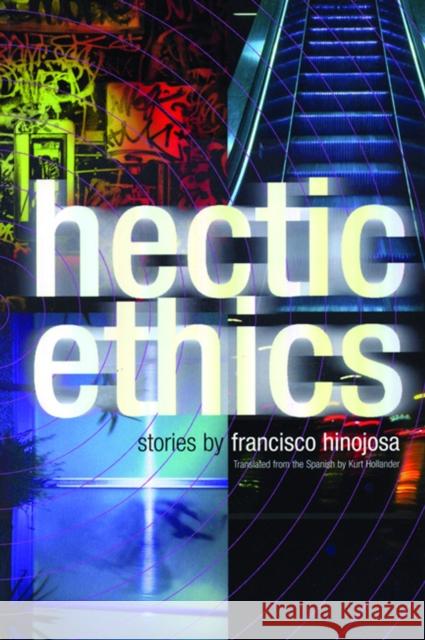Hectic Ethics » książka
Hectic Ethics
ISBN-13: 9780872863477 / Angielski / Miękka / 2001 / 104 str.
Unlike many Latin American writers whose work has been published in the United States, Francisco Hinojosa does not rely on magical realism, exotic recipes or cultural nostalgia. Rather, his stories convey a mercilessly sardonic view of family and society, and his ingenious array of anti-heroes embodies a conspicuous disdain for convention.Here, in eight masterly stories that are as cruel and pitiless as they are hilarious, he explores the complexities of love and human relationships. These fiercely funny picaresque adventures are peopled with characters who inspire feelings of both solidarity and derision, but let the reader beware: just when you find yourself laughing out loud, you might recognize your reflection in the funhouse mirror.-Francisco Hinojosa's stories are like a Mozart overture executed by a crazed orchestra playing noisemakers instead of violins.- -- Giullermo Sheridan-Known as the Mexican Brother Grimm, Hinojosa is internationally recognized for his children's fairy tales (The Old Lady Who Ate People). This collection offers eight of his brief experimental fables for adults contending with the absurdities of 20th-century life. . . . this a spirited and amusing book. In a new version of the creation story, God, bored by a regime of 'loneliness and silence' he has impetuously imposed, grows desperate to hear anything: 'he'd even be content with a poetry reading.' In another tale, an artist confesses a tryst to his wife because he had 'always believed that women can tell when a man has slept with an actress.' The translation is generally solid, especially given the challenges of experimental fiction. One hopes that more of Hinojosa's grown-up fables will be made available in English.---Publishers Weekly-A bright star in the Mexican literary firmament can now be enjoyed by U.S. readers in this first English translation of Hinojosa's work. The eight stories in this knockout collection reveal in no uncertain terms Hinojosa's mastery over a rewarding form, which he has tailored to fit his own personal expression. The short story thrives because of its flexibility, the elasticity of its definition; and this author manipulates the form with razor-sharp deftness and remarkable ingenuity. He writes sparingly but can hardly be called a minimalist, a label that tends to suggest a certain blandness of prose style. Instead, he luxuriates in language while stripping plot and characterization down to bare bones. His stories deal with the spirals of life--downward ones, in particular. Dark, sarcastic humor permeates them all ('the depression that was creeping up on him with dark feelers couldn't be halted either by a double session of psychoanalysis nor by his favorite television program'). 'An Example of Beauty' is structurally amazing. With no sense that this story is really a condensed novel in story clothing, Hinojosa satirizes the career climb of an artist who wants to create something beautiful and finds fame as a consequence. And 'This Time, the War Was Getting Serious' is a hilarious picture of families feuding in an apartment building, with shades of the Hatfields versus the McCoys and the Montagues versus the Capulets, with a hint of West Side Story thrown in.---Brad Hooper, Booklist, Francisco Hinojosa was born in Mexico City in 1954, and is the author of three story collections, two volumes of poetry, and numerous childrens' books. He is the recipient of Mexico's National Prize for the Short Story, among other awards.











